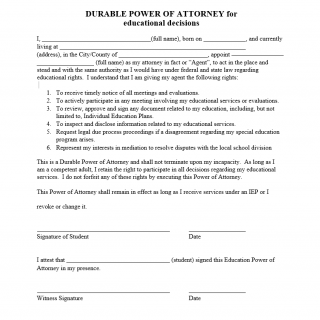Educational Power of Attorney
An educational power of attorney is a legal document that authorizes an agent, usually a parent or other trusted individual, to make educational decisions on behalf of a minor child. The document is useful when a parent or legal guardian cannot be present to make educational decisions for their child, or when the child is attending school in a different state or country.
The document consists of several sections that identify the parties involved, specify the powers granted to the agent, and detail any limitations or restrictions on those powers. The identification section specifies the minor child's details, such as their name, date of birth, and contact information. It will also specify the agent's details, who will act on the minor child's behalf.
The powers granted to the agent are typically broad and may include the ability to enroll the child in school, sign permission slips, attend parent-teacher conferences, and make educational decisions that affect the child's future, such as choosing a college or university. The document may also specify any limitations on the agent's powers or set conditions for the exercise of those powers.
The educational power of attorney is drawn up when a parent or legal guardian anticipates being unable to be present to make decisions for their child. This situation might arise, for example, if a parent is temporarily incapacitated or is traveling outside the country. The document legally authorizes the designated agent to make educational decisions on behalf of the child.
The parties involved in the educational power of attorney are the minor child, the parent or legal guardian who signs the document, and the agent who is authorized to make educational decisions on behalf of the child. This document confers authority on the named agent in case of the parent's or legal guardian's temporary inability to make educational decisions on behalf of their child.
When composing an educational power of attorney, it is crucial to consider the following features. A trusted and reliable agent should be named, as they will be responsible for making decisions that may have significant consequences for the child's education. Additionally, the document must be drafted in accordance with state law to avoid potential disputes or legal challenges.
The advantages of having an educational power of attorney are significant. It ensures that a trusted person can make educational decisions on behalf of the child when the parent or legal guardian is unavailable. This document can help avoid disruptions to the child's education and ensure that their future educational opportunities are not jeopardized due to unforeseen circumstances.
If the educational power of attorney is not correctly filled out, disputes may arise between the named agent and the parent or legal guardian. Additionally, issues may arise if the completed document does not comply with state law. To avoid such disputes, it is essential to have the document accurately drafted by a legal professional who is familiar with state legal requirements.
In conclusion, an educational power of attorney is a legal document that authorizes a trusted individual to make educational decisions on behalf of a minor child when the parent or legal guardian is unavailable. A well-drafted educational power of attorney can avoid disruptions to the child's education and ensure that their future academic opportunities remain uncompromised.

